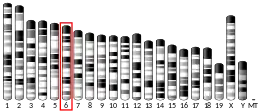| SERBP1 | |||||||||||||||||||||||||||||||||||||||||||||||||||
|---|---|---|---|---|---|---|---|---|---|---|---|---|---|---|---|---|---|---|---|---|---|---|---|---|---|---|---|---|---|---|---|---|---|---|---|---|---|---|---|---|---|---|---|---|---|---|---|---|---|---|---|
| |||||||||||||||||||||||||||||||||||||||||||||||||||
| Identifiers | |||||||||||||||||||||||||||||||||||||||||||||||||||
| Aliases | SERBP1, CHD3IP, HABP4L, PAI-RBP1, PAIRBP1, CGI-55, SERPINE1 mRNA binding protein 1 | ||||||||||||||||||||||||||||||||||||||||||||||||||
| External IDs | OMIM: 607378 MGI: 1914120 HomoloGene: 134277 GeneCards: SERBP1 | ||||||||||||||||||||||||||||||||||||||||||||||||||
| |||||||||||||||||||||||||||||||||||||||||||||||||||
| |||||||||||||||||||||||||||||||||||||||||||||||||||
| |||||||||||||||||||||||||||||||||||||||||||||||||||
| |||||||||||||||||||||||||||||||||||||||||||||||||||
| |||||||||||||||||||||||||||||||||||||||||||||||||||
| Wikidata | |||||||||||||||||||||||||||||||||||||||||||||||||||
| |||||||||||||||||||||||||||||||||||||||||||||||||||
Plasminogen activator inhibitor 1 RNA-binding protein (serbp1) is a protein that in humans is encoded by the SERBP1 gene.[5][6][7]
Interactions
References
- 1 2 3 GRCh38: Ensembl release 89: ENSG00000142864 - Ensembl, May 2017
- 1 2 3 GRCm38: Ensembl release 89: ENSMUSG00000036371 - Ensembl, May 2017
- ↑ "Human PubMed Reference:". National Center for Biotechnology Information, U.S. National Library of Medicine.
- ↑ "Mouse PubMed Reference:". National Center for Biotechnology Information, U.S. National Library of Medicine.
- ↑ Heaton JH, Dlakic WM, Dlakic M, Gelehrter TD (May 2001). "Identification and cDNA cloning of a novel RNA-binding protein that interacts with the cyclic nucleotide-responsive sequence in the Type-1 plasminogen activator inhibitor mRNA". J Biol Chem. 276 (5): 3341–7. doi:10.1074/jbc.M006538200. PMID 11001948.
- ↑ Lai CH, Chou CY, Ch'ang LY, Liu CS, Lin W (Aug 2000). "Identification of novel human genes evolutionarily conserved in Caenorhabditis elegans by comparative proteomics". Genome Res. 10 (5): 703–13. doi:10.1101/gr.10.5.703. PMC 310876. PMID 10810093.
- ↑ "Entrez Gene: SERBP1 SERPINE1 mRNA binding protein 1".
- ↑ Lemos TA, Passos DO, Nery FC, Kobarg J (Jan 2003). "Characterization of a new family of proteins that interact with the C-terminal region of the chromatin-remodeling factor CHD-3". FEBS Lett. Netherlands. 533 (1–3): 14–20. doi:10.1016/S0014-5793(02)03737-7. ISSN 0014-5793. PMID 12505151.
- ↑ Stelzl U, Worm U, Lalowski M, Haenig C, Brembeck FH, Goehler H, Stroedicke M, Zenkner M, Schoenherr A, Koeppen S, Timm J, Mintzlaff S, Abraham C, Bock N, Kietzmann S, Goedde A, Toksöz E, Droege A, Krobitsch S, Korn B, Birchmeier W, Lehrach H, Wanker EE (Sep 2005). "A human protein-protein interaction network: a resource for annotating the proteome". Cell. United States. 122 (6): 957–68. doi:10.1016/j.cell.2005.08.029. hdl:11858/00-001M-0000-0010-8592-0. ISSN 0092-8674. PMID 16169070. S2CID 8235923.
Further reading
- Maruyama K; Sugano S (1994). "Oligo-capping: a simple method to replace the cap structure of eukaryotic mRNAs with oligoribonucleotides". Gene. 138 (1–2): 171–4. doi:10.1016/0378-1119(94)90802-8. PMID 8125298.
- Andersson B, Wentland MA, Ricafrente JY, et al. (1996). "A "double adaptor" method for improved shotgun library construction". Anal. Biochem. 236 (1): 107–13. doi:10.1006/abio.1996.0138. PMID 8619474.
- Yu W, Andersson B, Worley KC, et al. (1997). "Large-scale concatenation cDNA sequencing". Genome Res. 7 (4): 353–8. doi:10.1101/gr.7.4.353. PMC 139146. PMID 9110174.
- Suzuki Y, Yoshitomo-Nakagawa K, Maruyama K, et al. (1997). "Construction and characterization of a full length-enriched and a 5'-end-enriched cDNA library". Gene. 200 (1–2): 149–56. doi:10.1016/S0378-1119(97)00411-3. PMID 9373149.
- Wiemann S, Weil B, Wellenreuther R, et al. (2001). "Toward a catalog of human genes and proteins: sequencing and analysis of 500 novel complete protein coding human cDNAs". Genome Res. 11 (3): 422–35. doi:10.1101/gr.GR1547R. PMC 311072. PMID 11230166.
- Bucková D; Izakovicová Hollá L; Vácha J (2002). "Polymorphism 4G/5G in the plasminogen activator inhibitor-1 (PAI-1) gene is associated with IgE-mediated allergic diseases and asthma in the Czech population". Allergy. 57 (5): 446–8. doi:10.1034/j.1398-9995.2002.03582.x. PMID 11972486. S2CID 23925569.
- Jones K, Powell J, Brown L, et al. (2002). "The influence of 4G/5G polymorphism in the plasminogen activator inhibitor-1 gene promoter on the incidence, growth and operative risk of abdominal aortic aneurysm". European Journal of Vascular and Endovascular Surgery. 23 (5): 421–5. doi:10.1053/ejvs.2002.1633. PMID 12027469.
- Strausberg RL, Feingold EA, Grouse LH, et al. (2003). "Generation and initial analysis of more than 15,000 full-length human and mouse cDNA sequences". Proc. Natl. Acad. Sci. U.S.A. 99 (26): 16899–903. Bibcode:2002PNAS...9916899M. doi:10.1073/pnas.242603899. PMC 139241. PMID 12477932.
- Lemos TA; Passos DO; Nery FC; Kobarg J (2003). "Characterization of a new family of proteins that interact with the C-terminal region of the chromatin-remodeling factor CHD-3". FEBS Lett. 533 (1–3): 14–20. doi:10.1016/S0014-5793(02)03737-7. PMID 12505151.
- Ota T, Suzuki Y, Nishikawa T, et al. (2004). "Complete sequencing and characterization of 21,243 full-length human cDNAs". Nat. Genet. 36 (1): 40–5. doi:10.1038/ng1285. PMID 14702039.
- Gerhard DS, Wagner L, Feingold EA, et al. (2004). "The status, quality, and expansion of the NIH full-length cDNA project: the Mammalian Gene Collection (MGC)". Genome Res. 14 (10B): 2121–7. doi:10.1101/gr.2596504. PMC 528928. PMID 15489334.
- Otsuki T, Ota T, Nishikawa T, et al. (2007). "Signal sequence and keyword trap in silico for selection of full-length human cDNAs encoding secretion or membrane proteins from oligo-capped cDNA libraries". DNA Res. 12 (2): 117–26. doi:10.1093/dnares/12.2.117. PMID 16303743.
- Lemos TA; Kobarg J (2006). "CGI-55 interacts with nuclear proteins and co-localizes to p80-coilin positive-coiled bodies in the nucleus". Cell Biochem. Biophys. 44 (3): 463–74. doi:10.1385/CBB:44:3:463. PMID 16679534. S2CID 24544907.
- Passos DO; Bressan GC; Nery FC; Kobarg J (2006). "Ki-1/57 interacts with PRMT1 and is a substrate for arginine methylation". FEBS J. 273 (17): 3946–61. doi:10.1111/j.1742-4658.2006.05399.x. PMID 16879614.
- Dalmáz CA, Santos KG, Botton MR, et al. (2006). "Relationship between polymorphisms in thrombophilic genes and preeclampsia in a Brazilian population". Blood Cells Mol. Dis. 37 (2): 107–10. doi:10.1016/j.bcmd.2006.07.005. PMID 16963292.
- Beausoleil SA, Villén J, Gerber SA, et al. (2006). "A probability-based approach for high-throughput protein phosphorylation analysis and site localization". Nat. Biotechnol. 24 (10): 1285–92. doi:10.1038/nbt1240. PMID 16964243. S2CID 14294292.
- Olsen JV, Blagoev B, Gnad F, et al. (2006). "Global, in vivo, and site-specific phosphorylation dynamics in signaling networks". Cell. 127 (3): 635–48. doi:10.1016/j.cell.2006.09.026. PMID 17081983. S2CID 7827573.
External links
This article is issued from Wikipedia. The text is licensed under Creative Commons - Attribution - Sharealike. Additional terms may apply for the media files.






